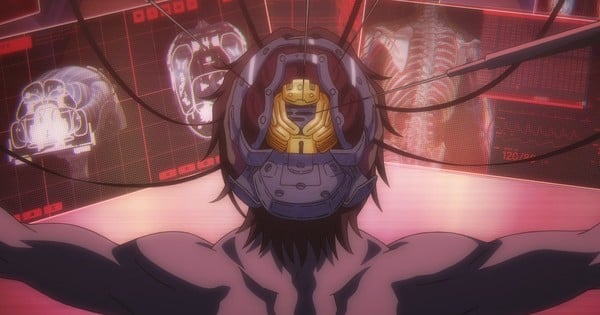Curated From www.animenewsnetwork.com Check Them Out For More Content.

© 山田胡瓜(秋田書店)/AIの遺電子製作委員会2023
One of modernity’s most frustrating contradictions is how the vast technological leaps of the past century have not instigated comparable leaps in people’s brains, neither individually nor collectively. If anything, the internet, arguably the most significant of these developments, seems to have fostered more regression than progression. Time and time again, its awesome power to spread information has been twisted into a blunt tool delivering misinformation and indoctrination. From an anthropological perspective, these results are hardly surprising, yet they’re a crushing blow to tech optimists who, in turn, often fall victim to those same regressive impulses. In short, cults and their causes haven’t gone anywhere, and that’s what Gene of AI explores this week.
Both halves invoke the Singularity, which, while an interesting idea in the context of science fiction, often takes on a vaguely religious (particularly Judeo-Christian) timbre when brought up in “serious” conversation. The concept seems especially intoxicating to tech leaders, whose inflated opinions of the importance of themselves and their field understandably make them susceptible to the idea that they will be the ones ushering in a new age of enlightenment. Gene reflects this by making the perp a respected brain surgeon—the sort of guy we expect to be intelligent and logical. But there’s nothing logical about the Singularity. It’s a crock of shit. A complete fantasy. If you want a definitive smoking gun, Elon Musk believes in it. Need I say more? Right now, there’s simply nothing in the field of computers that suggests such an advanced AI will ever be possible. We can’t even code an algorithm that draws the correct number of teeth in a person’s mouth, and people are having dire conversations about the inevitability of HAL 9000 taking over the world government. Get real.
That’s not to say there aren’t valid concerns about the rise of less sophisticated AI, and Gene has already gone into many of those concerns. There are also valid concerns about Michi, the superhuman AI that exists in their futuristic world. Sudo says as much at the end of the segment; there’s a lot of trust and faith that has to go into accepting Michi’s leadership, as there must go into any kind of governance. Society can only be built on mutual trust. It’s the erosion of that trust that drives people to seek alternate support structures, which are the seedbed of cults and their ilk. And again, that erosion can stem from legitimate grievances. The camera in this episode frequently reminds us of the constant surveillance in this future, and there’s the speed with which the police track down the surgeon, as well as his invocation of predetermined justice a la Minority Report or Psycho Pass. These things would certainly and justifiably breed paranoia in people.
However, legitimate grievances can be met with illegitimate responses. Looking at the surgeon’s descent into paranoia, conspiracy, and violence, it’s difficult to not be reminded most recently of the fervor around QAnon. There, again, you have a collective who feel screwed over by a system that failed them, but instead of seriously interrogating the weaknesses and possible improvements to that system, they blame everything on a secret cabal of pedophilic cannibals who worship Satan. It’s an irrational response based on a selfish desire to be the protagonist of the world. The surgeon murders an innocent woman because he wants to be the hero who single-handedly takes down Michi and helps mankind flourish. It’s scary how quickly these things can snowball.
The second half looks at a similarly irrational response to AI by drawing on the inherent woo-woo spiritualism of the Singularity. The narrative, through the reporter’s investigations and inquiries, is critical of Utako capitalizing on people’s search for salvation, but it’s also far nicer about it than I would be. As I said earlier, I think people who fall into cults can have good reasons for doing so, but these would be better served by support structures with more grounding in reality and direct action. I have no patience for those who would profit off desperate people by coddling them with comfortable lies. I understand Gene likes to go for more nuance, but cult leaders are one of the groups I wouldn’t give the benefit of the doubt. Having Utako be old friends with Sudo, and then giving the reporter a conveniently hospitalized dad, make this segment feel more toothless than it should be. Nevertheless, I’m very happy they gave the reporter those big bushy eyebrows. I will always commend that look when I see it in an anime.
With a couple more episodes to go in the season, it looks like Gene of AI will finally return to its “main” narrative about Sudo and his mom next week. I just hope it still leaves room for these digressions into various philosophical and societal topics, because that’s what I like most about the series. It’s a pretty darn average anime when you consider the production and the writing, which are both best described as adequately serviceable (or serviceably adequate). But as a critic, each episode has given me something neat to think and write about, which has made the process of these episode reviews disproportionately enjoyable when compared to the actual quality onscreen. As a result, I can’t speak for the more general audience and what they may or may not be getting out of Gene of AI. Speaking personally, though, if the show lets me rag on Elon Musk and QAnon in the same essay, on a website dedicated to anime, then it can’t be all bad.
Rating:
Gene of AI is currently streaming on
Crunchyroll.
Steve is on Twitter until the day it completely succumbs to the t-shirt bots. You can also catch him chatting about trash and treasure alike on This Week in Anime.

